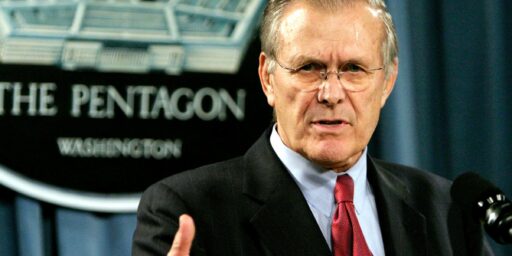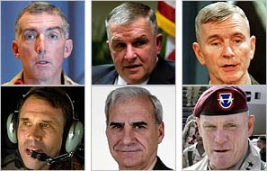Pentagon Report: Army Near Breaking Point
A report by a highly respected military analyst and commissioned by the Pentagon says that the strain of recent operations has the U.S. Army near breaking.
Stretched by frequent troop rotations to Iraq and Afghanistan, the Army has become a “thin green line†that could snap unless relief comes soon, according to a study for the Pentagon. Andrew Krepinevich, a retired Army officer who wrote the report under a Pentagon contract, concluded that the Army cannot sustain the pace of troop deployments to Iraq long enough to break the back of the insurgency. He also suggested that the Pentagon’s decision, announced in December, to begin reducing the force in Iraq this year was driven in part by a realization that the Army was overextended.
As evidence, Krepinevich points to the Army’s 2005 recruiting slump — missing its recruiting goal for the first time since 1999 — and its decision to offer much bigger enlistment bonuses and other incentives. “You really begin to wonder just how much stress and strain there is on the Army, how much longer it can continue,†he said in an interview. He added that the Army is still a highly effective fighting force and is implementing a plan that will expand the number of combat brigades available for rotations to Iraq and Afghanistan.
The 136-page report represents a more sobering picture of the Army̢۪s condition than military officials offer in public. While not released publicly, a copy of the report was provided in response to an Associated Press inquiry.
Illustrating his level of concern about strain on the Army, Krepinevich titled one of his report’s chapters, “The Thin Green Line.†He wrote that the Army is “in a race against time†to adjust to the demands of war “or risk ‘breaking’ the force in the form of a catastrophic decline†in recruitment and re-enlistment.
Col. Lewis Boone, spokesman for Army Forces Command, which is responsible for providing troops to war commanders, said it would be “a very extreme characterization†to call the Army broken. He said his organization has been able to fulfill every request for troops that it has received from field commanders.
I’ll see if I can get a copy of the report.
My inclination, from various other reports I’ve read and from numerous conversations with serving officers is that, while the Army is tired, it is far from broken. Still, when Krepinevich speaks about military affairs, I listen.
The Pentagon –and Secretary Rumsfeld, which is not always the same thing–will pay attention, too. A West Pointer with a Harvard Ph.D., his analyses have been quite prescient in the past. Not only does he have the professional bona fides to be taken seriously by the generals, but his is one of the founders of the Revolution in Military Affairs school of thought that has Rumsfeld so excited.
Guesting at Ace’s, Dave at Garfield Ridge, like me, guesses that Krepenovich’s “highlights don’t quite sync up with the ‘doom and gloom’ bits the Associated Press chooses to tout.” Further, he notes that, even in a multi-hundred billion dollar force, tradeoffs are a fact of life.
The Army *is* stretched thin. Everyone acknowledges that, the Pentagon and its critics alike. The question is, what do we do about it? Do we try to win the war with the force we currently have, with some modifications at the edges, or do we take an entirely different tack, and restructure the Army in order to combat the insurgency? Do we undergo wholesale changes in equipment, force structure, and manpower in order to fight and defeat this insurgency?
There are a few problems here. Again, there’s that threat assessment– we may be tailoring the Army to the war we have, but that might not be the gravest threat we face tomorrow, or even today. By radically changing the Army to win the war in Iraq as quickly and efficiently as possible is politically attractive. And I’m sure it could even save lives. But if saving hundreds of American lives in Iraq puts us at risk of losing tens of thousands of soldiers in East Asia, is that the right choice to make? It’s a cold-hearted calculation foreign to the “feelings” crowd, but it’s one that’s made every day when forced to balance resources with risk.
A fair point. Of course, if the preview of the RMA touted in the LAT yesterday is any indication, it may just be that Rumsfeld and company are determined to build their dream force regardless of the reality around them.




Hmmm, You’ll listen to him but when Murtha said the exact same thing, he was called a coward, traitor and defeatist.
I disagreed but Murtha’s call for pullout — as does Krepinevich, by the way — but called him none of those things.
None seems to believe that Republicans are some Borg-like collective entity.
Anyway, the obvious-to-me inference from this report is that we’re not invading Iran without the draft.
Which is as it should be. The Lesson We Won’t Learn from this last war is the gross injustice of using our NG and Reserves to fight a war without calling on the public at large. It’s as grotesque in its way as the college deferments during Vietnam, or the $200 payout during the Civil War.
Allowing presidents to fight wars at little political cost by relying on the NG/Reserves is just not a good idea. If Iraq needed invading, then the draft was entirely appropriate.
Quite so, Anderson. This is _exactly_ what Gen Abrams envisioned when he rebuilt the Army after Vietnam. It’s certainly arguable that he went beyond his mandate in doing so, but he set up the Guard and Reserves specifically so the US _could not_ engage in an extended overseas campaign without putting the country on a no-kidding wartime footing, which is something that Bush has staunchly refused to do (at least economically).
Bear in mind that WWII (at least for the US) lasted from Dec 41 to Aug 45 – less than 4 years. We’ve already got troops on their third combat rotation, and with no concrete end in sight (and the possibility of combat in Iran, Syria, or North Korea), it’s no big surprise that the well we’re currently tapping is running dry…
Less men more bombs? I think we should start up the draft, it would give all the young men running the streets something to do and some money to save for there future.And don’t give me none of that poor to war crap,its the way i grew up,and all my friends who went into the service ended up making something out of them selves,the one who kept running the streets kept running the streets and ended up staying poor or in prison or dead,and good many of them fight and kill any way, but for all the wrong reasons.P.S.One of my biggest regrets is not joining the service when i had the chance, wish they they would have drafted me.
If I were getting to give Iran a bad time with my military, I would want the Iranians to think my military was in bad shape, then lower a boom on them that would shake them down to their toes.
Boom: Nukes of course.
The Iranians want nukes, so we should accomidate them.
We need a bigger Regular Army (not counting Res and NG) and that’s the simple fact. I was astounded and bitterly disappointed when Bush did not increase significantly the size of the Army post-Clinton. The “peace dividend” cuts of the 90s went too far, but Bush did nothing to fix that situation, even after 9/11. We would have had plenty of volunteers in late 2001 to increase Army size, but Rumsfeld, who fancies himself a military visionary, had other ideas. He cherishes the fantasy that lots of high-tech gadgetry can substitute for real human beings with patriotic hearts beating in their chests. What “type” of force do we need? The more units you have the more types of units you can have — hence the most flexibility and versatility for present and potential conflicts, not to mention the diplomatic and deterrent value of a large force in readiness. I did serve in the First Gulf War, when the Powell doctrine was in place — there’s no such thing as overkill, not when American lives are at stake. Do we need a draft? I’m not so sure. Reagan was able to increase Army size in the 80s without one. It’s just a matter of how DOD spends its resources. Under Rumsfeld, high-tech corporate pork rules the day. By the way, Congress should grow a spine and pass legislation making it illegal to deploy Reserve and Nat Guard overseas without a Declaration of War.